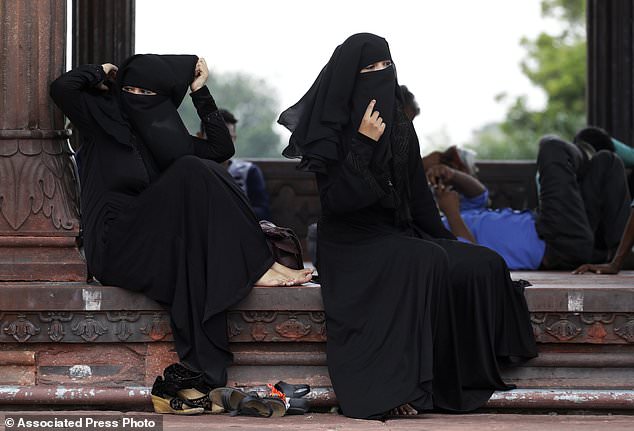
India bans Muslim men from instantly divorcing their wives by saying ‘talaq’ three times
- India’s Supreme Court outlawed ‘triple talaq’ instant divorce practice last year
- The court found that it violated the constitutional rights of Muslim women
- Government has now approved order to make the practice a punishable offence
India has banned Muslim men from instantly divorcing their wives by saying ‘talaq’ three times.
The country’s cabinet has approved an executive order to make the practice a punishable offence.
India’s Supreme Court outlawed ‘triple talaq’ last year ruling that it violated the constitutional rights of Muslim women.
But Prime Minister Narendra Modi’s government wants to make it a non-bailable offence carrying a jail term of up to three years, following a wave of protests.
Federal Law Minister Ravi Shankar Prasad told a news conference the cabinet approved the decree because the practice persisted despite the court decision.
In August last year, the Supreme Court ruled unconstitutional a law that allowed Muslim men to divorce their wives simply by uttering the word ‘talaq’, or ‘divorce’ in Arabic, three times.
The government has been trying to pass legislation to ‘explicitly ban’ the procedure.
In an Independence Day speech last month Modi said he would ‘not stop till they get justice,’ referring to the women.
Most of the 170 million Muslims in India are Sunnis governed by the Muslim Personal Law for family matters and disputes.
Prasad said that nearly 22 countries, including neighboring Pakistan and Bangladesh, have banned the practice and appealed to the opposition to approve the Muslim Women Protection of Rights on Marriage Bill.
India’s Muslim Law Board had told the court that while they considered the practice wrong, they opposed any court intervention and asked that the matter be left to the community. But several progressive Muslim activists decried the law board’s position.
After the Supreme Court verdict, Prime Minister Narendra Modi’s government introduced a bill criminalizing the practice and it was approved in December by the lower house of Parliament, where his party commands a majority.
But it couldn’t get the approval of the upper house, where the opposition controls the majority of seats.
The main opposition Congress party is opposing a three-year prison sentence for the offenders and wants a parliamentary committee to discuss the issue to reach a consensus. It favors a lesser sentence.
In India, triple talaq has continued with the protection of laws that allow Muslim, Christian and Hindu communities to follow religious laws in matters like marriage, divorce, inheritance and adoption.
While most Hindu personal laws have been overhauled and codified over the years, Muslim laws have been left to religious authorities and left largely untouched.






